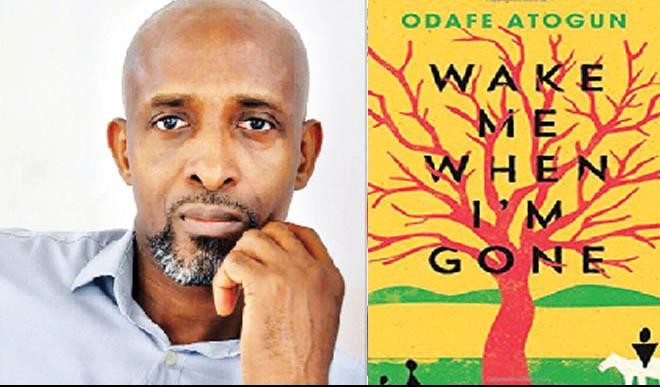Magical thinking in Nigeria-a review of Wake Me When I’m Gone by Odafe Atogun
Odafe Atogun’s second novel is set in a Nigerian village that could almost be described as magical. It is ruled by a despotic king and his council of priests; their worldview is, not surprisingly, patriarchal and ultra-conservative. Any form of dissent or innovation is punished with banishment, or death. Widows must marry within a […]


Odafe Atogun’s second novel is set in a Nigerian village that could almost be described as magical. It is ruled by a despotic king and his council of priests; their worldview is, not surprisingly, patriarchal and ultra-conservative. Any form of dissent or innovation is punished with banishment, or death.
Widows must marry within a prescribed period after losing their husbands; if they don’t, their children are taken away to live with their uncles, or in extreme cases exiled to the town limits and left there to forage or beg for their food. It is a cruel system crying out to be challenged, if someone is willing to pay the steep price that accompanies such defiance. An unlikely challenger emerges in the form of the beautiful and kindly Ese.
Ese has just lost her husband and must now face the brunt of the king’s merciless decree: she stands to lose her only son, Noah. Meanwhile, the precocious Noah has forged a strong bond with the town’s homeless orphans and convinced his mother that they must care for these children, even if it means facing the king’s wrath. It is a strong and eventful opening, and the stakes continue to rise. The king, it transpires, is hopelessly in love with Ese – he has always been, even before she married her late husband, Tanto. Marrying the king would offer Noah better odds of survival, even though the king’s many wives sometimes kill off each other’s male children to improve their own sons’ chances. But the rub is, as Ese explains to the king, she will only marry a man she loves, and she is not in love with him.
As in his first novel, Taduno’s Song, Atogun has combined folkloric elements with a strong central character to create a haunting and unusual narrative. His style is redolent of earlier African authors such as Amos Tutuola, Flora Nwapa and Gabriel Okara, who wrote what were loosely called “novels of local colour”, where the author pretends the colonial encounter never happened, and modernity is a distant phenomenon happening in the faraway city. Once in a while a visitor from the city will appear, exotic and interesting, but always viewed with suspicion.
The Africa of such narratives is made up of hermetically sealed societies and plotlines are often influenced by the intervention of the supernatural. The main characters’ greatest opposition is usually tradition and taboo, and those who use them to control and exploit the masses.
Clearly the gods love Ese. When she escapes her home village and arrives in another village with a similar tradition but with a younger, wiser king, she meets an older woman who tells her she has been waiting for her arrival for many years; the gods had foretold Ese’s arrival. The woman becomes Ese’s guardian and overnight Ese becomes rich and influential. The reader is of course expected to accept this divine intervention at face value – the implication being that Ese was chosen because of her purity of heart, and as a reward for her undeserved suffering at the hands of the village patriarch -and yet one can’t help but wonder what would have happened to Ese without this rich benefactor.
Would she have been able to effect her changes to society without her new-found riches and influence, or would she have been another victim of tradition and patriarchy? The critic James Wood, writing about David Mitchell’s The Bone Clocks, cautioned against introducing the supernatural into modern narratives. He claims that such devices relegate the characters to secondary status, robbing them of agency and turning them into mere vehicles for the whims and wishes of the gods. The human should always be at the centre of events; characters must stand or fall by their ingenuity alone, not by arbitrary divine intervention.
However, in Atogun’s defence, he is clearly not trying to write a modern tale. His story could be said to be an allegory about the endless contest between good and bad, and how the universe sometimes – but not always -sides with the good against the bad. Tradition can harbour both the good and the bad; Ese’s example shows that the bad must be resolutely and uncompromisingly opposed. It is a stark, almost puritanical worldview, but one whose severity is modified by this author’s beautiful imagery and evocative language.
• Helon Habila’s The Chibok Girls: The Boko Haram Kidnappings & Islamic Militancy in Nigeria is published by Penguin.
Source: Theguardian.com
